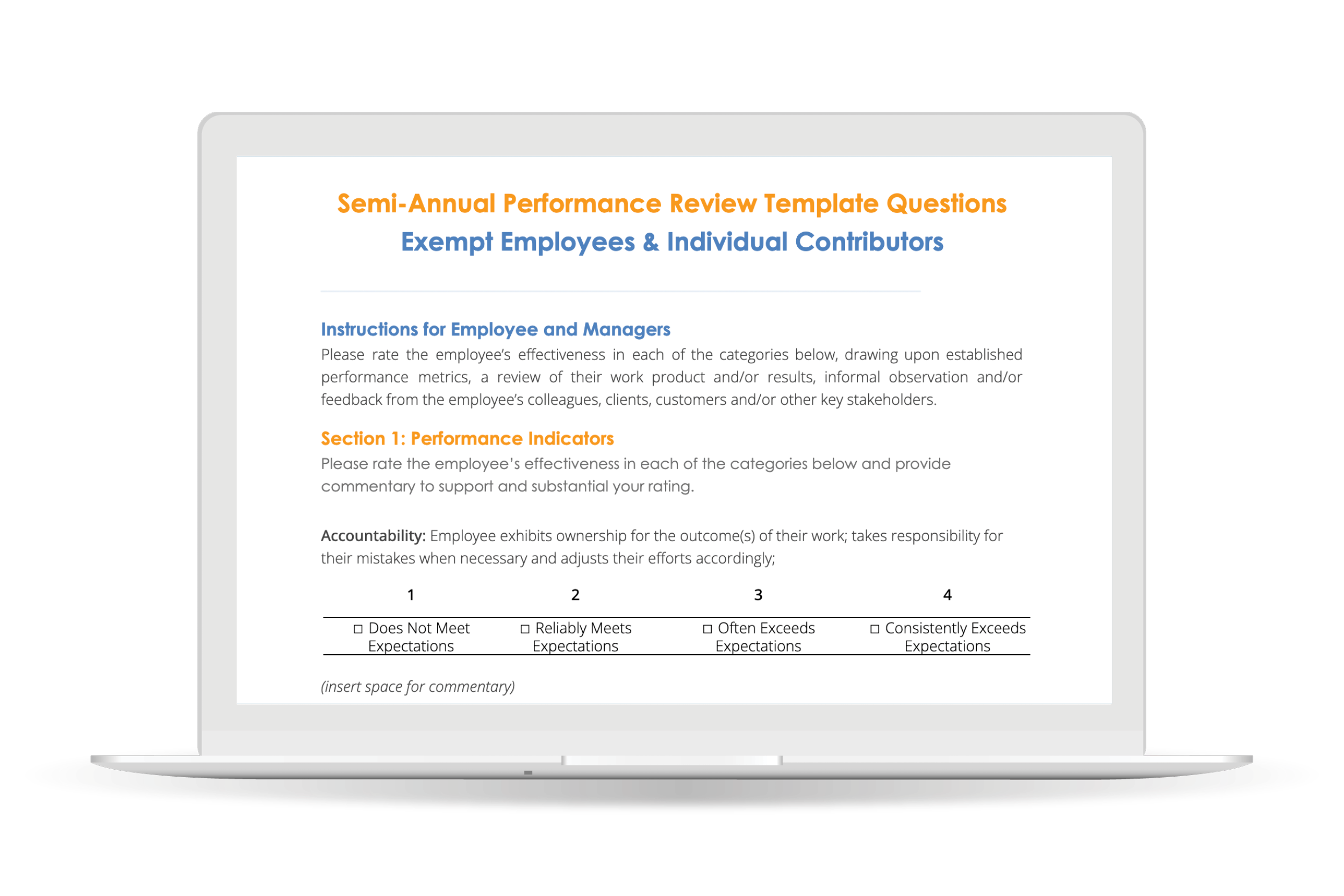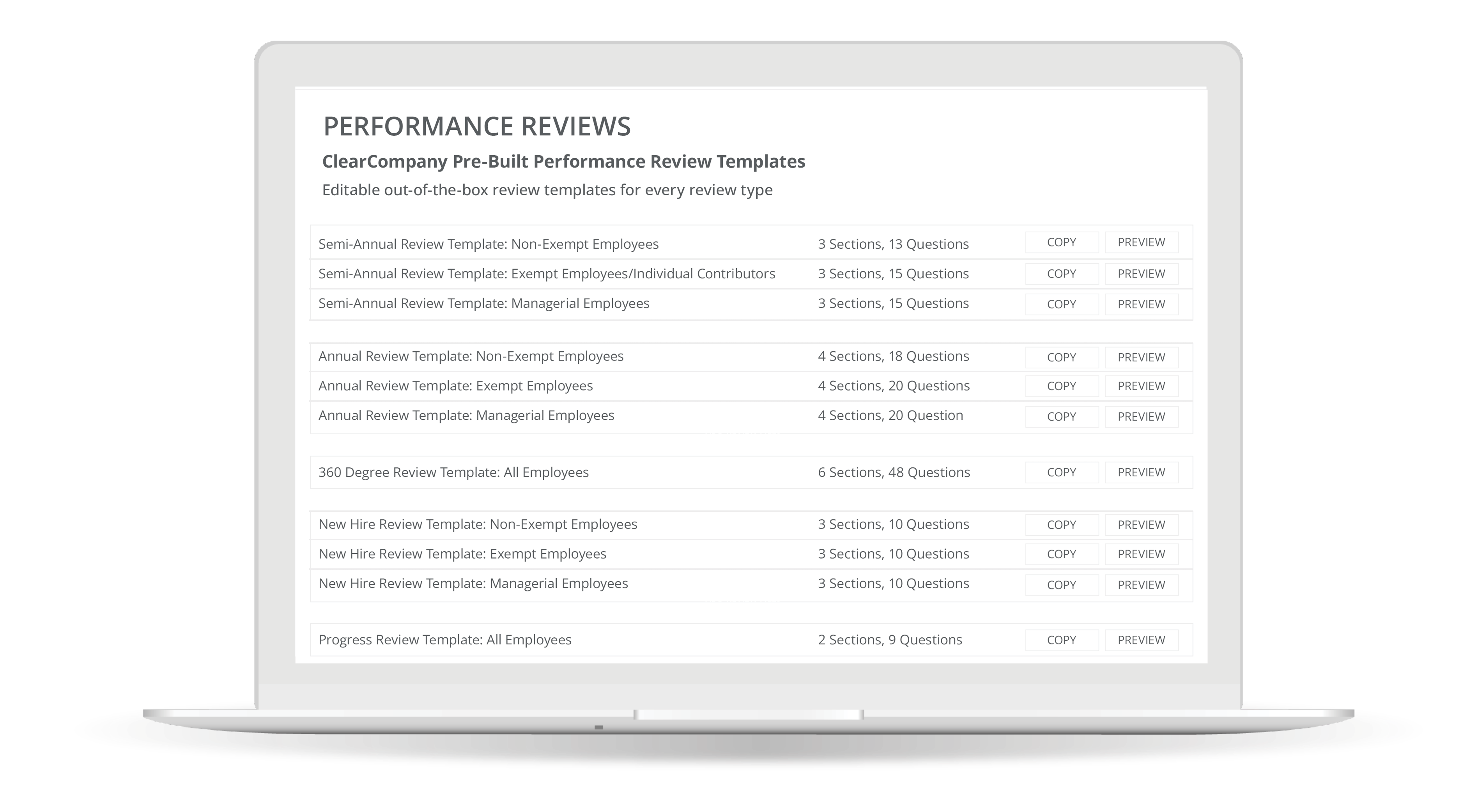This article is Part 2 in a three-part series with Erin Riska, SHRM-CP and HRCI -PHR, Performance Management Strategic Advisor to ClearCompany. Read Part 1 here and Part 3 here.
Erin Riska is the founder of Search & Rescue, LLC, a concierge consulting company offering integrated talent services, including performance management program design, recruitment process outsourcing, career coaching, and job-search strategy and support. A longtime people operations professional, Erin offers over 15 years of experience in human resources, performance management, talent acquisition, and training and development, working in partnership with companies, HR and people leaders, and candidates alike.
In our first installment of this three-part expert series on employee performance reviews, we covered some general best practices for the review process. We shared advice from performance management expert Erin Riska and ClearCompany specialists on new hire reviews, performance rating scales, and the necessity of reviews for managers.
In Part 2 of our Inspiring Employee Performance series, we’re taking a closer look at best practices for reviewing both exempt and non-exempt employees. Most organizations employ both exempt and non-exempt workers and need to give performance reviews based on employee status. Let’s take a closer look at best practices for reviewing your exempt and non-exempt employees. Then, download our expert-built performance review templates to get started at your organization.
Conduct effective #PerformanceReviews for exempt and non-exempt employees with @ClearCompany’s expert-built review templates:What are Exempt and Non-Exempt Employees?
In short, the difference between exempt and non-exempt employees is that non-exempt employees are eligible for overtime under the Fair Labor Standards Act (FLSA) and exempt employees are not. The Department of Labor provides more guidance around determining which roles are subject to overtime pay laws under the FLSA. The FLSA also establishes the federal minimum wage, child labor laws, and recordkeeping rules for employees’ time and pay.
Here are more details of the FLSA rules concerning overtime pay:
- Non-exempt employees are paid an hourly rate and are entitled to overtime pay according to the FLSA. The FLSA mandates that non-exempt employees must be paid overtime pay of 1.5x their regular pay rate when working more than 40 hours per week.
- Exempt employees receive a salary of at least $684 per week and work in administrative, outside sales, executive, professional, or computer-related roles. As the name implies, exempt employees are not covered by the FLSA and are not entitled to overtime pay. Criteria for who qualifies as an exempt employee varies by state.
Although the performance indicators used for evaluating exempt and non-exempt employees may differ, many elements of the review process remain the same. According to Riska, “No matter a worker’s role classification or the wage they’re paid, the components of effective performance evaluation should be consistent: a two-part process comprised of a written appraisal and real-time conversation.”
With that in mind, let’s look at different ways to approach reviews for exempt and non-exempt employees.
Performance Reviews for Non-Exempt Employees
Often referred to as blue-collar workers, non-exempt employees are sometimes left out during performance review season. Organizations may not prioritize reviews for these employees due to many factors:
- Expense
- Time constraints
- Labor required to coordinate and conduct reviews
But our experts pointed to high turnover for non-exempt employees as a top reason to conduct regular reviews. Skipping these important performance conversations is detrimental to your employees’ success and that of your business. When companies assume that non-exempt employees don’t need performance reviews, “the employee experience may be marked by a sense that neither they nor their work matter all that much, making workers more likely to leave,” said Riska.
“Given the assumptions about the engagement level and aspirations of workers in roles that are often referred to as low-skill and/or high-turnover, employers may feel that the time, energy, and effort involved in conducting regular performance reviews is too significant. In turn, the employee experience may be marked by a sense that neither they nor their work matter all that much, making workers more likely to leave.”
- Erin Riska, Performance Management Strategic Advisor to ClearCompany
Riska and the ClearCompany experts recommend evaluating non-exempt employees on the basis of these eight core competencies:
- Attendance and Punctuality
- Communication
- Customer Focus
- Initiative
- Job Knowledge
- Productivity
- Quality
- Teamwork
Investing in employee development and coaching for non-exempt employees by including them in performance review cycles and conducting one-on-one performance conversations is an excellent way to increase engagement levels and demonstrate that their contributions are valued. It’s also an excellent way for management to identify good candidates for supervisory positions.
Riska and ClearCompany also recommend a twice-annual review cycle for non-exempt employees. A twice-yearly cycle “enables employers to draw a distinction between assessing progress and planning for progression,” said Riska. It also helps companies keep employees motivated, help underperforming employees improve, and connect to those at risk of leaving the organization.
Performance Reviews for Exempt Employees
Performance reviews for exempt employees, (often referred to as “white-collar” workers) are not without their challenges, too. In addition to the time-consuming nature of the review process, other issues include a lack of standardized methods of measuring performance and negative associations that many of us have with performance reviews.
Performance reviews are essential for both hourly and salaried employees: they’re motivating and help you identify supervisory candidates. Get 5 expert-built #PerformanceReview templates from @ClearCompany for more effective reviews:But that doesn’t have to be the case for review cycles at your organization. “By asking the right questions in order to understand what employees find most meaningful, what motivates them, and what they aim to achieve — and empowering them to target their efforts accordingly — employers can build a bench of highly-engaged and effective employees,” said Riska.
Riska and the ClearCompany experts recommend using these ten core competencies to evaluate exempt employees:
- Accountability
- Business Literacy
- Collaboration
- Drive
- Inclusivity
- Interpersonal Skill
- Influence
- Planning and Organization
- Problem Solving
- Results
Similar to non-exempt employees, Riska also recommends mid-year and annual performance reviews for exempt employees. This is so that employees and their managers have the opportunity to both review past performance and set new goals. That’s also why ClearCompany’s performance review templates include “future-focused” performance review questions, like this one:
What are the employee’s “secret strengths?” Are there things the employee enjoys and excels at, but is not responsible for in their current role?
The bottom line? Each one of your employees needs the opportunity to discuss their past performance, evaluate their progress, and plan ahead for the future. Regular performance review cycles that leave room for evaluation and goal-setting create a workforce that feels valued, stays engaged, and is always improving.
Your company can execute more effective, productive performance appraisals for your salaried and hourly employees with ClearCompany’s expert-built review templates:
- Semi-Annual Review for Exempt Employees
- Annual Review for Exempt Employees
- Semi-Annual Review for Non-Exempt Employees
- Annual Review for Non-Exempt Employees
- 360-Degree Review
Download our expert-built employee performance review templates for exempt and non-exempt employees, plus a 360-Degree Review review template, and get a headstart on your next performance review cycle.


